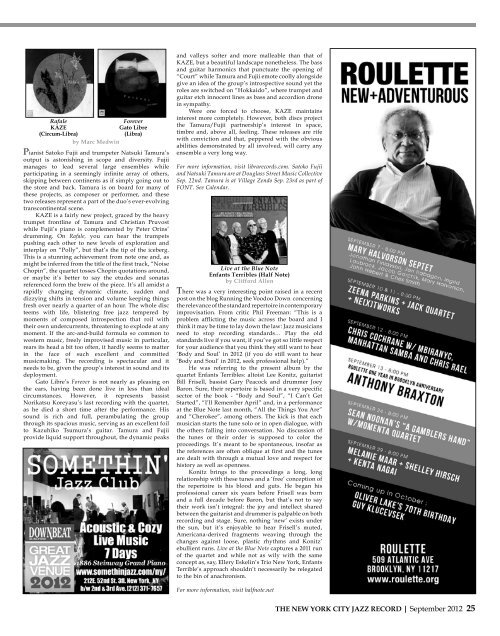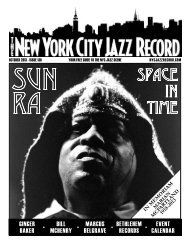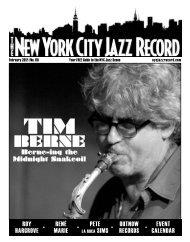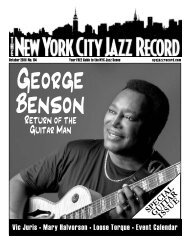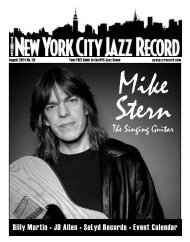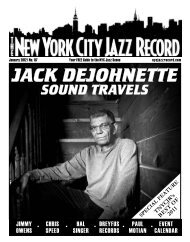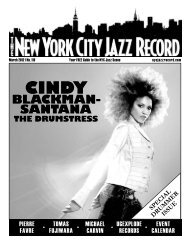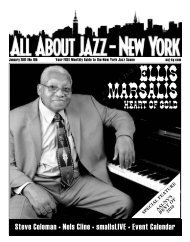September 2012 - The New York City Jazz Record
September 2012 - The New York City Jazz Record
September 2012 - The New York City Jazz Record
You also want an ePaper? Increase the reach of your titles
YUMPU automatically turns print PDFs into web optimized ePapers that Google loves.
Rafale<br />
Forever<br />
KAZE<br />
Gato Libre<br />
(Circum-Libra)<br />
(Libra)<br />
by Marc Medwin<br />
Pianist Satoko Fujii and trumpeter Natsuki Tamura’s<br />
output is astonishing in scope and diversity. Fujii<br />
manages to lead several large ensembles while<br />
participating in a seemingly infinite array of others,<br />
skipping between continents as if simply going out to<br />
the store and back. Tamura is on board for many of<br />
these projects, as composer or performer, and these<br />
two releases represent a part of the duo’s ever-evolving<br />
transcontinental scene.<br />
KAZE is a fairly new project, graced by the heavy<br />
trumpet frontline of Tamura and Christian Pruvost<br />
while Fujii’s piano is complemented by Peter Orins’<br />
drumming. On Rafale, you can hear the trumpets<br />
pushing each other to new levels of exploration and<br />
interplay on “Polly”, but that’s the tip of the iceberg.<br />
This is a stunning achievement from note one and, as<br />
might be inferred from the title of the first track, “Noise<br />
Chopin”, the quartet tosses Chopin quotations around,<br />
or maybe it’s better to say the etudes and sonatas<br />
referenced form the brew of the piece. It’s all amidst a<br />
rapidly changing dynamic climate, sudden and<br />
dizzying shifts in tension and volume keeping things<br />
fresh over nearly a quarter of an hour. <strong>The</strong> whole disc<br />
teems with life, blistering free jazz tempered by<br />
moments of composed introspection that roil with<br />
their own undercurrents, threatening to explode at any<br />
moment. If the arc-and-build formula so common to<br />
western music, freely improvised music in particular,<br />
rears its head a bit too often, it hardly seems to matter<br />
in the face of such excellent and committed<br />
musicmaking. <strong>The</strong> recording is spectacular and it<br />
needs to be, given the group’s interest in sound and its<br />
deployment.<br />
Gato Libre’s Forever is not nearly as pleasing on<br />
the ears, having been done live in less than ideal<br />
circumstances. However, it represents bassist<br />
Norikatsu Koreyasu’s last recording with the quartet,<br />
as he died a short time after the performance. His<br />
sound is rich and full, perambulating the group<br />
through its spacious music, serving as an excellent foil<br />
to Kazuhiko Tsumura’s guitar. Tamura and Fujii<br />
provide liquid support throughout, the dynamic peaks<br />
and valleys softer and more malleable than that of<br />
KAZE, but a beautiful landscape nonetheless. <strong>The</strong> bass<br />
and guitar harmonics that punctuate the opening of<br />
“Court” while Tamura and Fujii emote coolly alongside<br />
give an idea of the group’s introspective sound yet the<br />
roles are switched on “Hokkaido”, where trumpet and<br />
guitar etch innocent lines as bass and accordion drone<br />
in sympathy.<br />
Were one forced to choose, KAZE maintains<br />
interest more completely. However, both discs project<br />
the Tamura/Fujii partnership’s interest in space,<br />
timbre and, above all, feeling. <strong>The</strong>se releases are rife<br />
with conviction and that, peppered with the obvious<br />
abilities demonstrated by all involved, will carry any<br />
ensemble a very long way.<br />
For more information, visit librarecords.com. Satoko Fujii<br />
and Natsuki Tamura are at Douglass Street Music Collective<br />
Sep. 22nd. Tamura is at Village Zendo Sep. 23rd as part of<br />
FONT. See Calendar.<br />
Live at the Blue Note<br />
Enfants Terribles (Half Note)<br />
by Clifford Allen<br />
<strong>The</strong>re was a very interesting point raised in a recent<br />
post on the blog Running the Voodoo Down concerning<br />
the relevance of the standard repertoire in contemporary<br />
improvisation. From critic Phil Freeman: “This is a<br />
problem afflicting the music across the board and I<br />
think it may be time to lay down the law: <strong>Jazz</strong> musicians<br />
need to stop recording standards… Play the old<br />
standards live if you want, if you’ve got so little respect<br />
for your audience that you think they still want to hear<br />
‘Body and Soul’ in <strong>2012</strong> (if you do still want to hear<br />
‘Body and Soul’ in <strong>2012</strong>, seek professional help).”<br />
He was referring to the present album by the<br />
quartet Enfants Terribles: altoist Lee Konitz, guitarist<br />
Bill Frisell, bassist Gary Peacock and drummer Joey<br />
Baron. Sure, their repertoire is based in a very specific<br />
sector of the book - “Body and Soul”, “I Can’t Get<br />
Started”, “I’ll Remember April” and, in a performance<br />
at the Blue Note last month, “All the Things You Are”<br />
and “Cherokee”, among others. <strong>The</strong> kick is that each<br />
musician starts the tune solo or in open dialogue, with<br />
the others falling into conversation. No discussion of<br />
the tunes or their order is supposed to color the<br />
proceedings. It’s meant to be spontaneous, insofar as<br />
the references are often oblique at first and the tunes<br />
are dealt with through a mutual love and respect for<br />
history as well as openness.<br />
Konitz brings to the proceedings a long, long<br />
relationship with these tunes and a ‘free’ conception of<br />
the repertoire is his blood and guts. He began his<br />
professional career six years before Frisell was born<br />
and a full decade before Baron, but that’s not to say<br />
their work isn’t integral: the joy and intellect shared<br />
between the guitarist and drummer is palpable on both<br />
recording and stage. Sure, nothing ‘new’ exists under<br />
the sun, but it’s enjoyable to hear Frisell’s muted,<br />
Americana-derived fragments weaving through the<br />
changes against loose, plastic rhythms and Konitz’<br />
ebullient runs. Live at the Blue Note captures a 2011 run<br />
of the quartet and while not as wily with the same<br />
concept as, say, Ellery Eskelin’s Trio <strong>New</strong> <strong>York</strong>, Enfants<br />
Terrible’s approach shouldn’t necessarily be relegated<br />
to the bin of anachronism.<br />
For more information, visit halfnote.net<br />
THE NEW YORK CITY JAZZ RECORD | <strong>September</strong> <strong>2012</strong> 25


